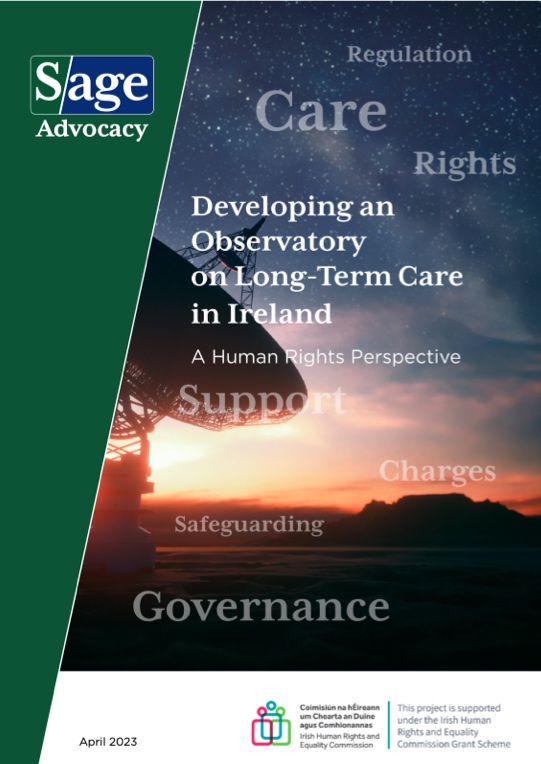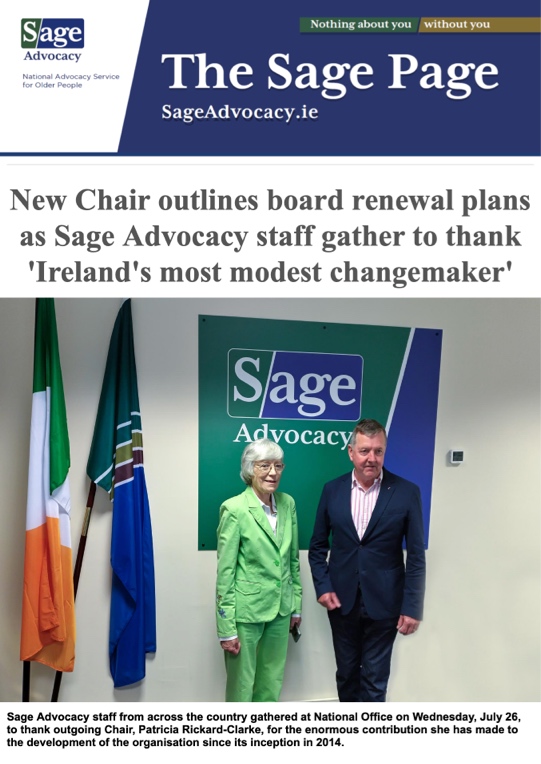Observatory on Long-Term Care
In 2023, Sage Advocacy undertook a project to examine how an Observatory on Long-term Care might provide vital evidence and perspective to inform the Government’s planned Commission on Care for older people and, thereafter, ongoing policy development and implementation. Such an observatory would also have a role in informing media and public debate regarding systemic issues that have a real impact on the lives of older people and their families and friends. The project and its report proposed a structure that would allow such a body to best monitor the human rights situation for people availing of long-term care and support services in Ireland; one that includes and amplifies the voices of long-term care recipients themselves.
Ahead of any move by the State to set up an Observatory as envisaged, Sage Advocacy is working to perform some of its functions, with a view to reporting its findings in to the Commission on Care.
If you wish to highlight an issue that is impacting across the system of long-term care in Ireland – in the arena of home care, congregated care, the private sector, or something else – and that you believe should be considered for action by the Commission on Care, get in touch via info@sageadvocacy.ie.
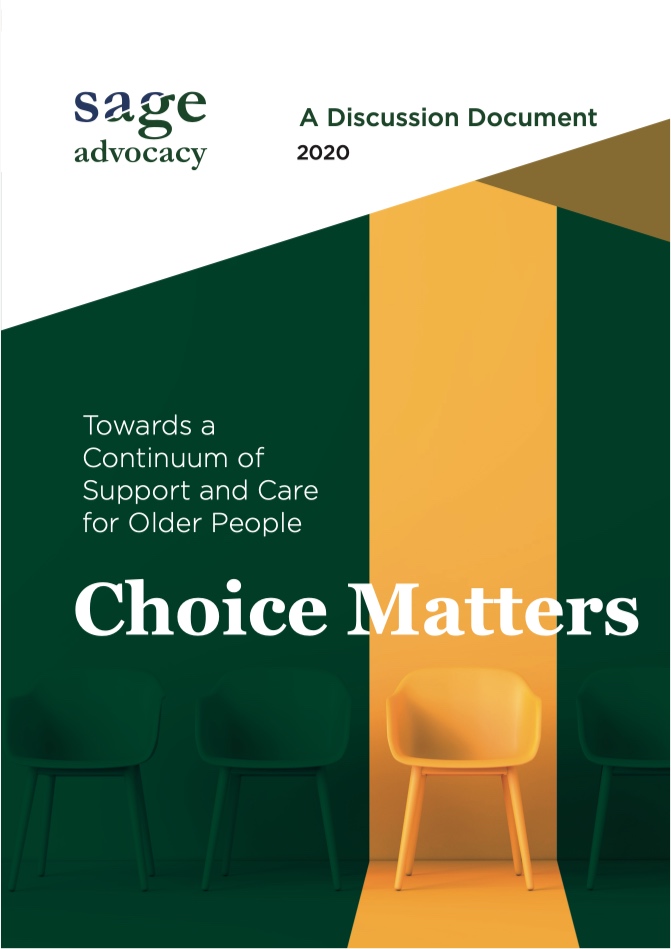
Choice matters - towards a continuum of support and care for older people
The Covid-19 public health emergency has exposed how Ireland’s current long-term support and care system, with its high reliance on residential nursing homes, was “totally inadequate” to safeguard vulnerable, older people, a new discussion document highlights today. Choice Matters, published by Sage Advocacy, examines how the “dangerous architecture” on which the current system of care in congregated settings for older people is built, presented major difficulties in responding to the challenges of Covid-19.
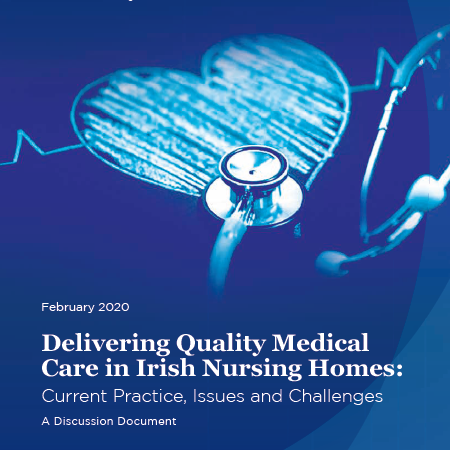
Delivering quality medical care in irish nursing homes: current practice, issues & challenges
The Delivering Quality Medical Care in Irish Nursing Homes Discussion Document is aimed at encouraging debate about medical care in nursing homes in Ireland by identifying current practice and highlighting issues as identified by key stakeholders. It describes existing policy, legislative and regulatory provisions and current practice by GPs and locates these, as far as possible, with reflective practices in other comparable jurisdictions. It also describes blockages and challenges identified by key stakeholders and sets out possible options for addressing these. Areas where further research and development would be helpful are also identified.
It is not intended that the Discussion Document would be a definitive statement on the matter but rather a broad narrative on:
a. Current GP practice in providing the medical care required by nursing home residents
b. The current and evolving challenges in doing so in a manner that is effective in meeting patients’ needs, and
c. Delivering care of the highest quality possible, and sustainable in the longerterm It is envisaged that the Document could be used as a basis for ongoing dialogue and policy discourse in order to ensure that nursing home residents get the best possible medical care and on an equal basis with those living in the community.

A new deal: a discussion document on funding long-term support and care (may 2019)
This discussion document has been developed by Sage Advocacy to call for and inform a national debate on putting in place a sustainable long-term care financing system. This issue is not going to go away. Put simply, the question is where is Ireland to find the money to pay for long-term care in an ageing society. In recent years, Ireland has shown the world that it can maturely deal with sensitive issues through structured public consideration and debate. It is now time to debate and then decide on a system for financing long-term care in an ageing society.

Financing long-term care in an ageing society the challenge facing Ireland
This document is a summary of a Discussion Document being developed by Sage Advocacy on Financing Long-Term Care in Ireland. Putting in place a sustainable long-term care financing system requires detailed consideration by Government and substantial consideration by the public. This issue is not going to go away. Put simply, the question is where is Ireland to find the money to pay for long-term care in an ageing society. In recent years, Ireland has shown the world that it can maturely deal with sensitive issues through structured public consideration and debate. It is now time to debate and then decide on a system for financing long-term care in an ageing society.
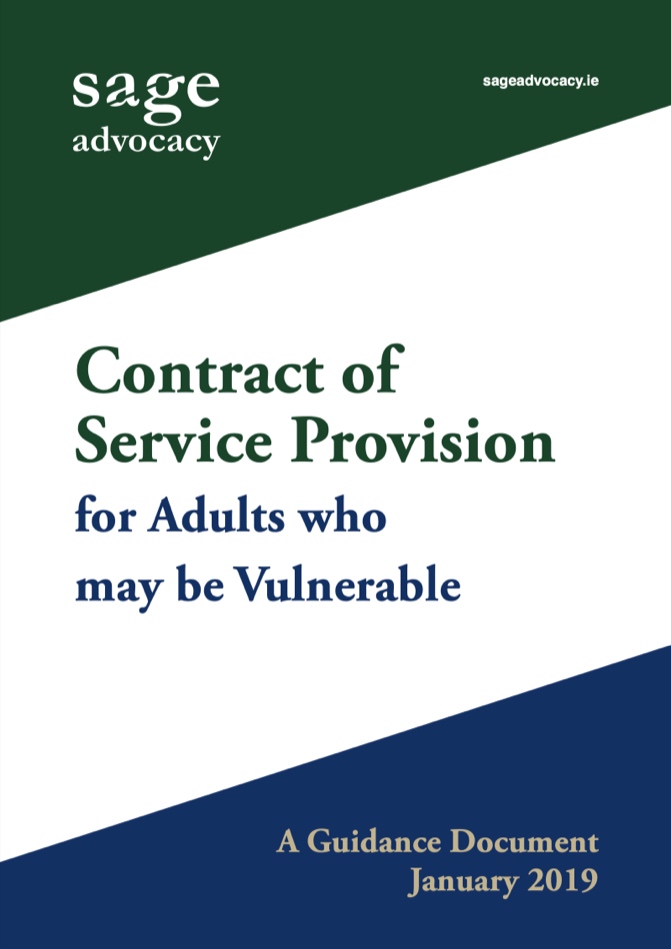
Contract of service provision for adults who may be vulnerable
In 2017, Sage Advocacy undertook a review of Nursing Home Contracts within the public and private sector and in September 2017 it published Contracts of Care for Nursing Home Residents – Issues for Policy and Practice. Among the findings were that contracts of care were signed by relatives rather than the individual concerned, there is a need for plain English and audio versions of contracts, different practices and lack of clarity in circumstances where a person is making decisions on another person's behalf, additional charges implemented without consultation and residents not informed of incidental expenses taken from their personal finances. In 2018, Sage Advocacy commissioned a review of Contracts of Care within Disability Service Providers. The findings of this review highlighted strong similarities to the findings outlined within the Nursing Home Contracts discussion paper. In order to address these findings and to ensure the promotion and protection of the rights, freedoms and dignity for those bound by the Contracts of Care within Disability Services, Sage undertook the development of this Guidance Document on the Contract of Service Provision for Adults who may be Vulnerable.
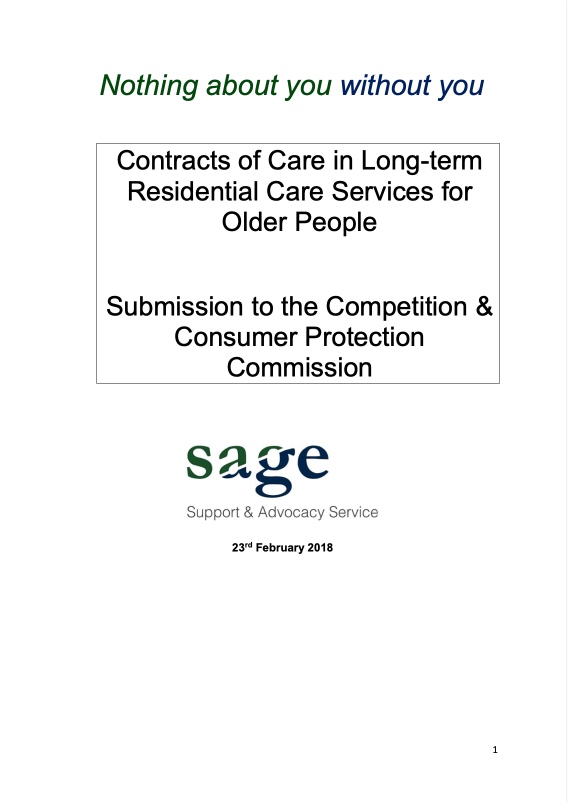
Sage submission to CCPC on contracts of care in residential services
In February 2018 Sage made a submission to the Competition and Consumer Protection Commission's public consultation on contracts of care in long-term residential care services for older people. Sage outlined the difficulties with contracts of care, identified measures that should be taken to address these issues, put forward suggestions for what provisions should and should not be in a contract of care and developed an indicative list of FAQs that service providers could use to make a contract easier to understand.
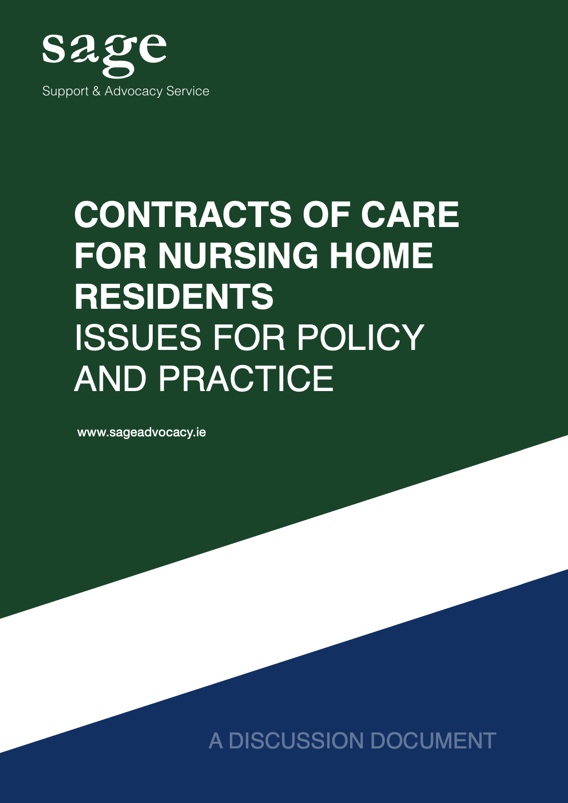
Contracts of care for nursing home residents: issues of policy and practice
In October 2017 Sage launched a report examining Contracts of Care for nursing home residents which found that residents in private nursing homes are treated less favourably than those in public nursing homes in respect of notice of termination of contract, and that contracts may be unlawfully signed by a resident’s family member. The report recommended an overhaul of both the content of contracts of care and of the manner in which residents are expected to deal with the contracts.
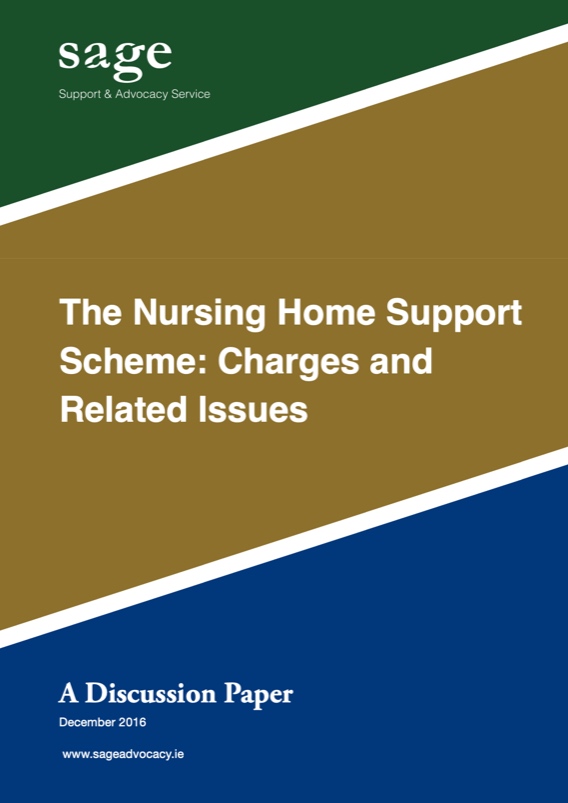
The nursing home support scheme: charges and related issues discussion paper
Sage carried out a public consultation on nursing home fees and charges in 2016, with Dr. Michael Browne preparing a discussion paper on the topic which states there is an urgent need for more debate around nursing home fees and charges as these apply to people who avail of the Nursing Home Support Scheme (NHSS), the so called ‘Fair Deal’.
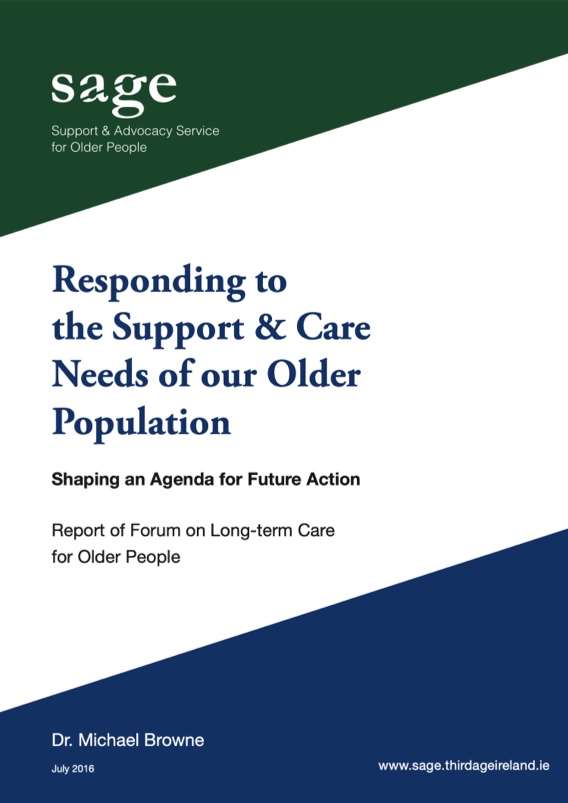
Report of forum on long-term care for older people
Sage in partnership with Third Age, Family Carers Ireland and Alone established a Forum on Long-Term Care, and launched the report ‘Responding to the Support and Care Needs of Our Older Population’ at an event in June 2016. The report found there is a broad consensus on the direction that our approach to supporting older people who need care should take. This includes enabling people to stay at home and in their own communities for as long as possible, to cater for people at the lowest appropriate level of complexity and the need to provide high quality residential care when and if this is needed.

Planning the cost of home and/or residential care
Working out a budget for personal and social care costs can be difficult. Some people pay for all of their care while others supplement their care costs both for home and residential cost with State funded provisions and support. U3A Sutton Baldoyle, a member of Fingal Senior Citizens Forum, have put together a very simple starter template budget spreadsheet as a tool which you may find useful to start thinking about preparing a forecast estimate of costs and how it will be funded. The template can be used/adapted for both home and/or residential care – for a single person or a couple. The Template Tool: The process is simple, first ask yourself - How much income do I have and how much expenditure will I expect/forecast? Then input these figures on the template. The cost for home care is mainly based on an hourly rate by the number of hours. While residential care is based on a weekly/monthly basis, both can vary significantly between providers and where you live. Start with how many hours you expect each week, input this and then estimate an hourly rate (for example an hourly rate can be up to €30 per hour and residential can be on average €1250 per week). Project annually and then for a few years. Click on the image to download the template tool.
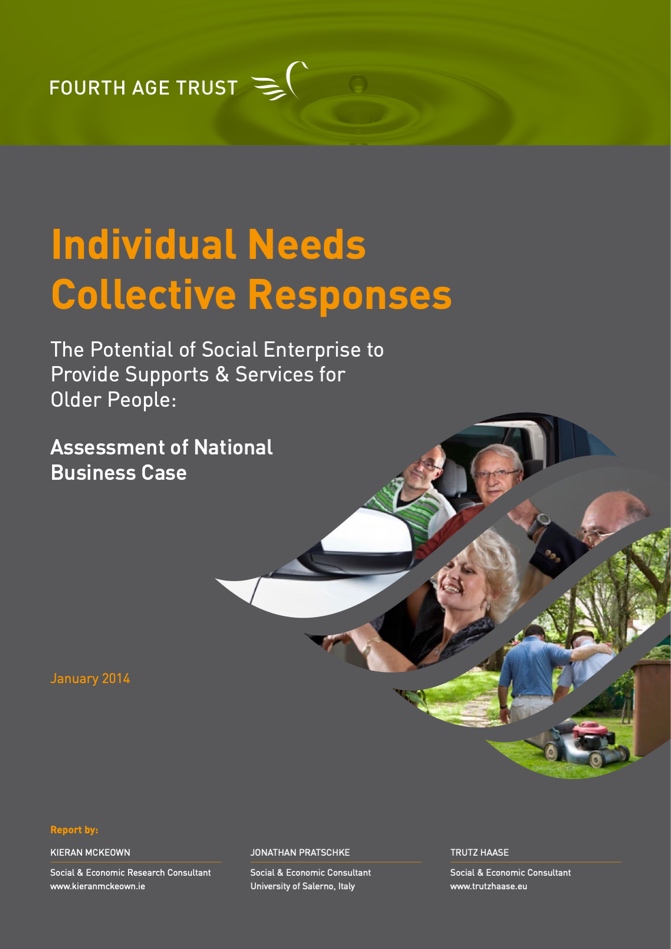
Individual needs collective responses - the potential of social enterprise to provide supports & services for older people
This report by Fourth Age Trust (January 2014) assesses the national business case for a social enterprise to provide services for older people in Ireland. The proposed social enterprise is informed by the same vision for older people that informs national policy, namely “to enhance the quality of life of older people, maintain their full potential, support them in their homes and communities” and enable them “to live in their homes for as long as possible rather than go into residential care”. The social enterprise proposes to provide a range of services, including but not confined to, personal care, health care, practical care and house care. The services will be individualised to meet the needs and preferences of each person and integrated with their existing networks of support and care, both formal and informal.

